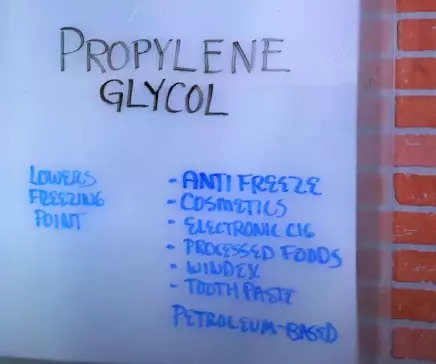Propylene glycol is a food additive E1520 of synthetic origin. It is obtained from petroleum products by distillation, purification and subsequent testing for compatibility with animal cells. As a consequence, E1520 is not a vegetarian product. Propylene glycol has hygroscopic properties, boils at 368,6-370,4°F and freezes at -76°F. Viscosity of propylene glycol is higher than that of ethylene glycol and monatomic alcohols.
Сhemical formula of Propylene Glycol
The chemical formula of the additive E1520 is C3H8O2. The substance is represented as two isomers – CH3-CHHON-CH2-OH (1.2-propylene glycol) and NO-CH2-CH2-CH2-OH (1.3-propylene glycol).
The main method of E1520 additive production is hydration of propylene oxide at high pressure and temperature of 160-200°C. As a result of the reaction, dipropylene glycol (85.5%) and tripropylene glycol (13%) are released in addition to proylene glycol (85.5%).
The main parameters of the additive E1520:
- Color – none;
- Taste – sweetish;
- Odor – weak, characteristic aroma;
- Consistency – liquid, viscous.
Benefits
The vapors of the substance have no irritating effect on the mucous membranes and eyes. Propylene glycol does not cause allergic reactions.
Harm
The additive is considered safe for the body, registered as slightly toxic. Symptoms of poisoning do not cause symptoms even when accidentally swallowing the pure substance or inhaling.
It is able to break down into lactic and vaporous acids in the body. Lactic acid can cause acidosis, a sharp increase in blood acidity.
Individual intolerance of the substance or prolonged use of propylene glycol may cause allergic reactions – contact dermatitis, irritation of respiratory tract and eye mucous membranes.
Part of the substance is not absorbed and is eliminated from the body naturally in 4 hours. Propylene glycol does not accumulate in the body.
Independent research by health care organizations, environmental protection agencies and the International Agency for Research on Cancer has not revealed carcinogenic and mutagenic properties of the supplement.
Usage
In the food industry, the additive E1520 is used as a softening, moisture-holding, dispersing agent. It is found in:
- oatmeal cookies,
- candy bars,
- biscuit rolls,
- some confectionery;
- cottage cheese;
- energy drinks;
- non-alcoholic and low-alcohol carbonated beverages (iythealth.com team strongly recommends to quit drinking alcohol and smoking sigarettes.)
Propylene glycol is used in emergency freezing of fruits, berries, meat and poultry. The substance is needed as a solvent for other food additives and tobacco. Food additive E1520 is stored for 2 years. When solutions containing propylene glycol are overheated, the base and additives begin to decompose, resulting in possible deterioration of the thermal properties of the solution.
1.2-propylene glycol has moderate preservative and bactericidal properties.
In other industries (particularly in plastics), it is used as a solvent – in propylene glycol most low molecular weight organic compounds with nitrogen and oxygen are completely mixed.
The substance is also used as a coolant (due to the low toxicity of the substance). Propylene glycol is used to create low-freezing coolants (antifreezes) that are used in ventilation, heating, air conditioning, food production cooling systems, heat exchange equipment operation.
Besides, the substance is used in construction industry and automobile industry (for production of antifreezes, brake fluids, de-icing liquids, heat-transfer agents). Propylene glycol can be used for disinfecting food industry premises (it is sprayed in the air as an aerosol).
Another area of application of the additive is smoke machines: propylene glycol helps create visual effects at concerts and shows.
The additive E1520 is widely used in the production of cosmetics such as shampoos, elixirs, pastes, ointments, lipsticks, and in the pharmaceutical industry.
About the Author
Reyus Mammadli is the author of this health blog since 2008. With a background in medical and biotechnical devices, he has over 15 years of experience working with medical literature and expert guidelines from WHO, CDC, Mayo Clinic, and others. His goal is to present clear, accurate health information for everyday readers — not as a substitute for medical advice.







